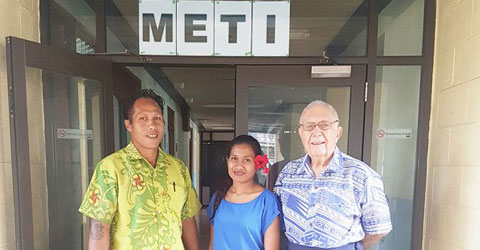
My name is Walter Vermeulen I am a Medical Doctor. I also hold a Masters Degree in Community Health from the University of Liverpool (UK). For the past 14 years I have been the Executive Director of METI, an environmental Charitable Trust in Samoa, a small Pacific Island nation of 200,000 people. One of the main objectives of the Trust is ‘capacity building of grassroots communities for self-reliance’, which is highly relevant these days in view of the looming climate crisis that Samoans are bracing for.
This capacity building effort is multi-sectoral and includes the Health sector. As in so many developing countries around the world, Samoa is plagued with an epidemic of obesity and non-communicable diseases (NCD). Recent national statistics estimate that 5 out of 10 Samoan adults are obese, 1 out of 4 has diabetes and 1 out of 5 has hypertension. Because of my medical background I have run the Samoa Sleep Clinic for the past 14 years under METI’s banner. A Government subsidy scheme covers 90% of the cost of diagnosing and treating sufferers of Sleep Apnea. In 2012, observing an upward trend of NCD co-morbidities among the patients I became disenchanted with the routine medical treatment of these conditions. A chance viewing of the Forks Over Knives Dvd set me on the path (of no return) of WFPB nutrition. I enrolled and graduated from the online Plant-Based Nutrition Certificate program and after experiencing the personal benefits of the diet, in October 2012, I started to organise a weekly Health Seminar at METI’s Headquarters focusing on WFPB nutrition. The seminar consists of interactive training with patients from the Sleep Clinic suffering from obesity and NCD and includes a power point presentation that ‘distils’ the medical information contained in the bestseller publications of Prof. T. Colin Campbell and Dr. Thomas Campbell, as well as Drs. Esselstyn, Ornish, Barnard and McDougall. As part of the seminar, participants are offered a tasting session where they are able to sample WFPB recipes prepared by METI’s staff. By word of mouth and publicity in the local media, the Health Seminar has become very popular and more and more people in the capital, Apia, are attending the weekly sessions. The local Ministry of Health has pledged full support for METI’s efforts and facilitated a modest grant from WHO, which has allowed METI to set up the necessary kitchen facilities and produce a DVD in the Samoan language showing the preparation of simple and culturally acceptable WFPB recipes.
Since 2010, METI runs a ‘Taiala’ programme, covering 20 villages around Samoa. ‘Taiala’ (Samoan for ‘path-breaker’) are individuals born and raised in the particular village in which they are deployed. They are employed by METI as frontline health, education and development workers. These multi-purpose workers are trained as life skills coaches and are versed in interactive (participatory) group training. Since January 2014, they have conducted Healthy Living courses, wherein WFPB nutrition is popularised at the grassroots level. Recently, in 10 villages the Taiala have conducted household surveys to identify adults suffering from obesity or NCD. This ‘target group’ has been screened and offered a Health Seminar similar to the one available at METI Headquarters. Preliminary findings show that about 20% of the target group are agreeing to follow (if not strictly – at least partly) WFPB nutrition guidelines. The Taiala are monitoring weekly their progress. This Health initiative is supported by a grant from the US Embassy until end October, by which time there should be enough data to evaluate the effectiveness of this outreach program to control obesity and reverse NCD among the rural populations of Samoa.
You Might Also Like
Copyright 2025 Center for Nutrition Studies. All rights reserved.
Deepen Your Knowledge With Our
Plant-Based Nutrition
Certificate
Plant-Based Nutrition Certificate
- 23,000+ students
- 100% online, learn at your own pace
- No prerequisites
- Continuing education credits










